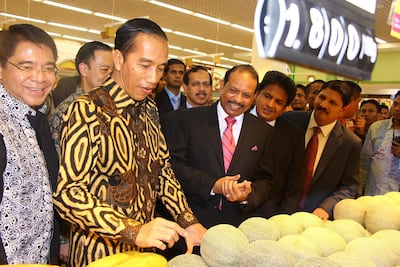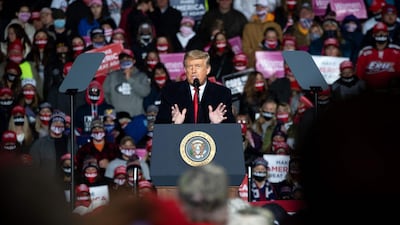The tree doesn’t fall far from the fruit. That’s what, more or less, came to my mind as soon as the map of Florida bled in bright red on the giant Fox News screen in the middle of Times Square in New York. Only hours earlier, I playfully told friends that we should celebrate Hillary Clinton’s impending victory in the US presidential election in nearby Trump Tower along Fifth Avenue.
Perhaps I will be equally surprised after next week's presidential election. But that night in 2016, with dazed eyes and horrified faces latched onto a mostly red map of America – depicting the Republican Party's unexpected victory – a tinge of deja vu washed over me. I swiftly realised that the same populist wave that took over my country just months earlier had now conquered the world’s greatest democracy. All of a sudden, America's politics seemed to be mimicking that of its former colony, the Philippines.
Donald Trump’s victory was greeted with widespread optimism in the Philippines and elsewhere – a rich contrast to many poor New Yorkers who broke into tears on that fateful election night. Millions of Filipinos saw in the new US President a powerful vindication of their own controversial choice at home, which unsurprisingly invited an avalanche of sneer and derision among the chattering classes.
Countless Filipino-Americans, including a few relatives, were ecstatic, having proudly voted for the former reality show star and self-proclaimed billionaire. Unsurprisingly, as America’s credibility cratered throughout the world, Mr Trump still managed to remain immensely popular in the Philippines as well as India and Vietnam. But what exactly explains this phenomenon?
Why are so many denizens of these faraway post-colonial nations so enamoured with the most divisive and unpopular American President in recent memory? The answer lies at intersections of history, democracy fatigue and geopolitics.
Bromance of the Century
Throughout 2016, a year that changed history, global media branded the Philippines’ populist President Rodrigo Duterte the “Trump of the East”. But for me, especially as a Filipino, it was Mr Trump who was, at least chronologically speaking, the “Duterte of the West”.
For the next four years, the two mavericks would unleash a torrent of disinformation and chaos at home, upending once vibrant democracies with unfathomable determination. They also shook up the global geopolitical landscape with thunderous rhetoric and notoriously disruptive policies.
Mr Duterte quickly became the Philippines’ first openly pro-China leader, even (falsely) claiming to be of Chinese descent, while swearing at the outgoing American president Barack Obama and threatening to end the two nations' century-old alliance.
Equally dramatic, albeit on a far larger scale, Mr Trump deployed his own fire and fury by lashing out at allies, threatening neighbours and becoming America’s most openly anti-China President in recent history. Almost single-handedly, the populist in the White House triggered a "new Cold War" by targeting not only Chinese exports, but even sanctioning the latter’s national champions and most high-profile global companies.

While Mr Trump pressed his campaign slogan, “Make America Great Again” – an astute rebranding of a long-established “America First” tradition – Mr Duterte promised to make the Philippines truly “independent” by exploring alternative partners in the East.
And yet, as I predicted just days after Mr Trump’s election, the two populists, one a self-proclaimed “socialist” and the other a New Cold Warrior, would build an unusual rapport. On a personal level, this made perfect sense.
Psychoanalytically speaking, here were two "macho" leaders and alpha males, who mirrored each other in a narcissistic embrace. Ideologically, both men successfully ran on an anti-establishment and proudly illiberal agenda against what they saw as a snobbish and deracinated "globalist" elite.
Touting law and order, Mr Trump would oversee draconian anti-immigration policies, while Mr Duterte would obsess over his scorched-earth drug war. In a personalised cult of action, they found a shared catharsis for national salvation.
Together, they formed the core of a right-wing "populist internationale" stretching from Budapest to Brasilia.
Interestingly, their bromance is shared by their core supporters. From Guam to mainland America, numerous Republicans, as soon as they realised my nationality, openly shared their admiration for Mr Duterte as a “strong leader”, especially his tough rhetoric on crime.

The Opium of Populism
In the Philippines, where there are no real ideological divides or genuine political parties, praise for Mr Trump is far more democratic, including from those who despise Mr Duterte. There are three key reasons for this seemingly strange phenomenon.
First, what we are witnessing across the world is what I have described as a “strongman syndrome”, namely the enduring yet naive belief that a single-minded and decisive leader can solve complex 21st-century challenges with sheer political will.
A century earlier, German sociologist Max Weber foresaw such “charismatic” leaders, who, in the eyes of their devout supporters, “[are] endowed with supernatural, superhuman, or at least specifically exceptional powers or qualities".
In a world of rapid change and deep uncertainty, existential anxiety is driving millions of people into the embrace of strongmen and father figures, who promise stability and safety in times of rapid transformation.
Collective faith in democratic institutions and economic globalisation has virtually collapsed across the world. The upshot is a Freudian "regression", namely the infantilisation of masses in the shadow of charismatic leadership.
According to a 2017 Pew survey, a majority of respondents in places such as the Philippines, India and Indonesia are open to an authoritarian leader, who can provide swift and decisive solutions. In the Philippines, Asia’s oldest democracy, only 15 per cent categorically supported representative democracy.

The number was even lower in Indonesia (12 per cent) and India (8 per cent), both under populist leaders, as well as in Vietnam (8 per cent), where the communist regime remains popular. As in his populist counterparts from Mr Duterte of the Philippines to Narendra Modi of India, Mr Trump is a masterful self-promoter who enjoys wide global appeal among those who yearn for the clarity of one-man rule.
The second factor is the enduring social conservatism in places such as the Philippines, extending even to the Filipino-American diaspora. After three centuries of Spanish "friarocracy" and a century of American domination, many Filipinos tend to be socially conservative and economically libertarian, namely sceptical of both big government and progressive reforms.
No wonder then, Mr Trump’s right-wing republicanism remains deeply appealing to many Filipinos both in the US and across the Pacific Ocean. In fact, it’s in the Philippines, where the American populist enjoys the highest approval ratings in the world (69 per cent), while Filipinos are his biggest supporters among Asian-Americans.
The final key factor is China. In the past decade, Beijing has expanded its military footprint across its borders, from the Himalayas to the South China Sea, fuelling growing anti-China sentiments from New Delhi to Hanoi and Manila.
Mr Trump’s tough talk, trade war and growing military deployments across China’s adjacent waters seem to resonate with a vast majority of people in frontline states such as the Philippines, Vietnam and India. What I found most fascinating are the pro-Trump sentiments even among liberal friends and social media followers, who are fans of neither Mr Duterte nor Mr Modi but see China as an existential threat to global freedom.
In Mr Trump, even Asian liberals seem to have found their "knight in shining armour" against the new communist colossus. And thus, while increasingly unpopular at home, Mr Trump remains a premier brand among Asia’s oldest democracies, the Philippines and India, and China’s communist brethren, Vietnam.
Richard Javad Heydarian is a Manila-based academic, having taught political science at Ateneo De Manila University and De La Salle University, Philippines














